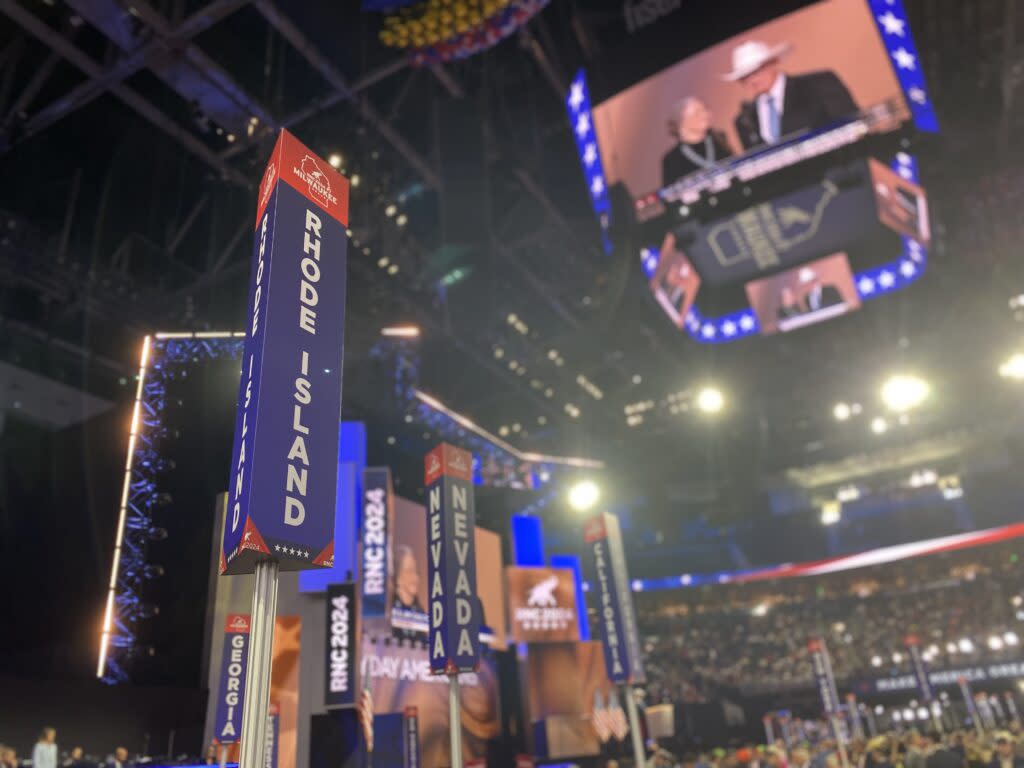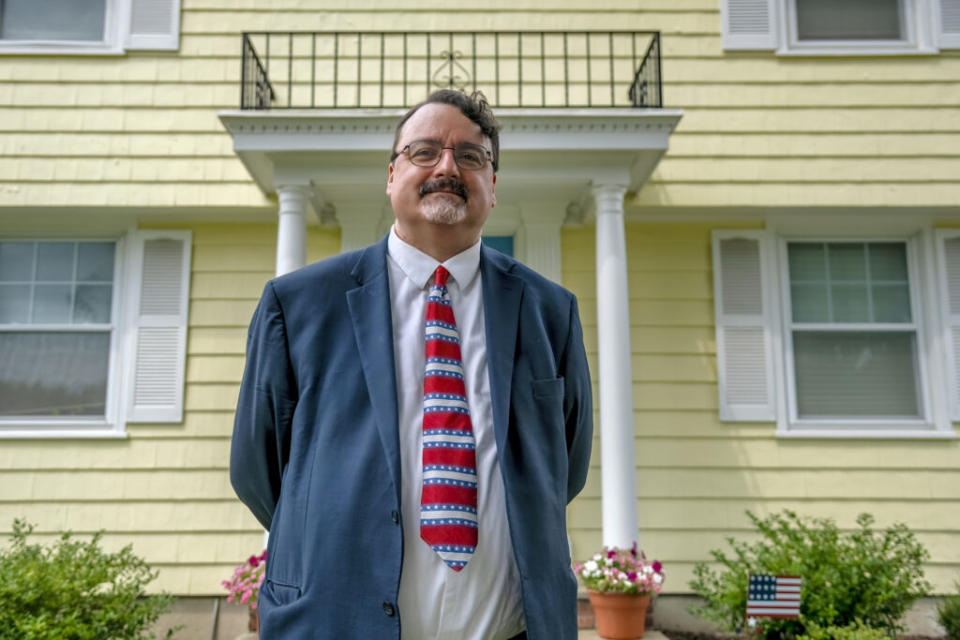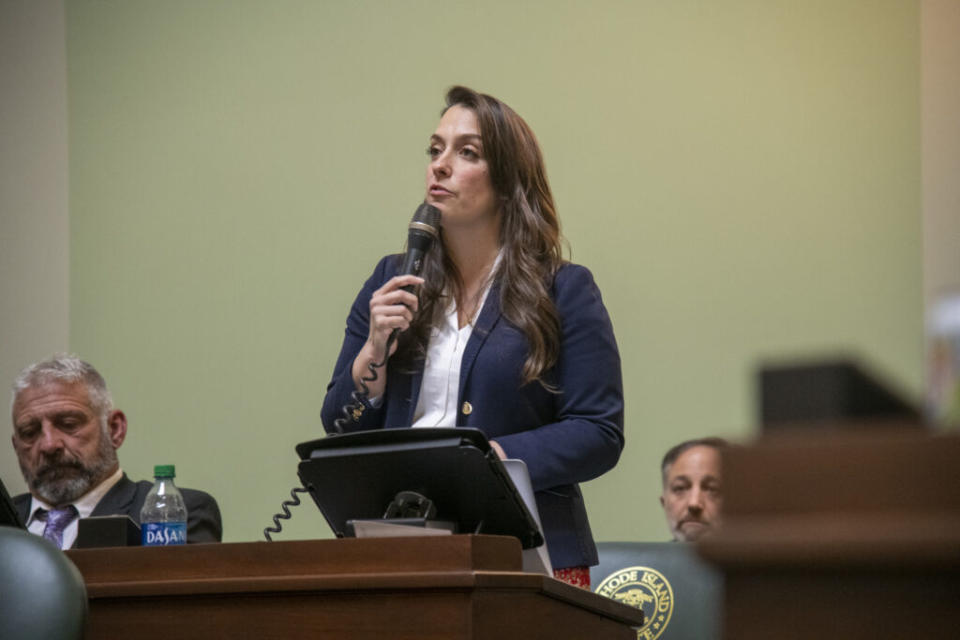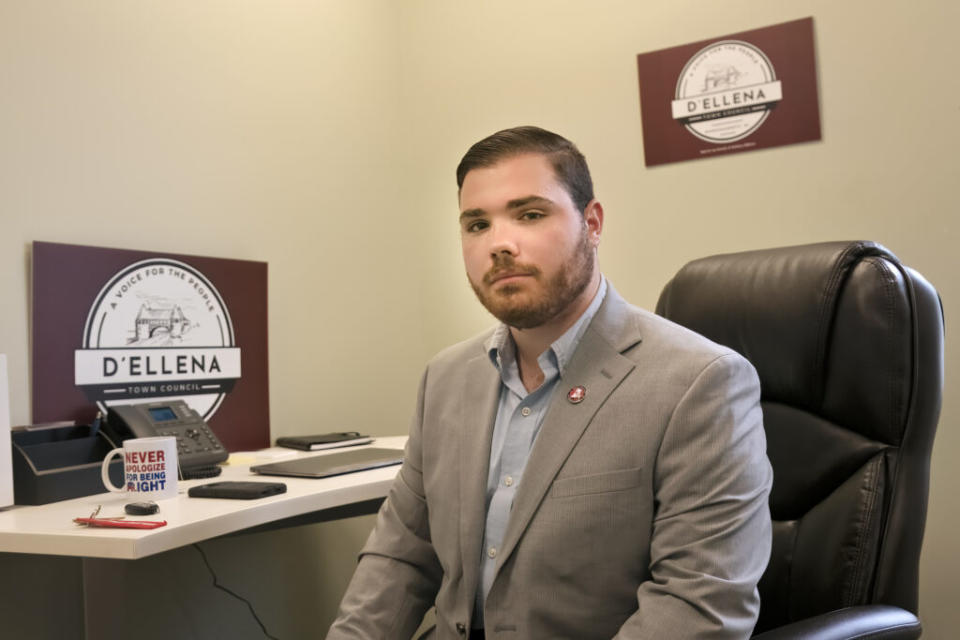What will it take to make the Rhode Island Republican party great again?

- Oops!Something went wrong.Please try again later.
- Oops!Something went wrong.Please try again later.
The Rhode Island delegation sign is shown at the Republican National Convention at the Fiserv Forum on July 17, 2024 in Milwaukee. On the screen are Arizona rancher Jim Chilton and his wife Sue Chilton speaking on the convention's third day. (Jennifer Shutt/States Newsroom)
Days after Donald Trump’s conviction in the New York hush-money trial, Steve Frias finally broke his silence.
The Rhode Island Republican National Committeeman told party leaders he would not seek reelection to the post he’d held for 12 years, denouncing Trump and his supporters for alleging the trial and verdict were politically motivated.
“I kept procrastinating, hoping something would change, thinking ‘maybe I am wrong here,’” said Frias, an attorney who lives in Cranston.
But he knew it was the right thing to do based on the relief he felt the minute he stepped away. He longer had to feign allegiance to the presumptive nominee at the state party convention in late June, or the Republican National Convention in July.
Yet many Rhode Island Republicans tiptoe around the topic of Trump. They may be fearful of stepping out of line with the national party. More importantly, they may want to avoid alienating the 47% of Rhode Island voters who are unaffiliated.
No Republican has won a federal or general office seat in the state in over a decade. And now, their marginal presence in the 113-seat Rhode Island Legislature could diminish even further, with three of the 14 Republican incumbents not seeking reelection in November and fewer than 30 Republican challengers for Democratic-held, or open seats.
While national politics isn’t entirely to blame, the shifting ideology of the national Republican party certainly hasn’t helped Rhode Island Republicans, said Wendy Schiller, a political science professor and interim director for the Thomas J. Watson Institute for International and Public Affairs at Brown University.
“The national Republican party is really out of step with what Rhode Islanders want and what they believe,” Schiller said in a recent interview. “It presents a real challenge for local candidates when your national party is saying it wants to cut Medicaid, doesn’t believe in climate change, doesn’t support infrastructure spending — all things Rhode Island desperately needs.”
Not to mention, the lack of cash and resources the Rhode Island GOP has to offer to candidates already facing an uphill battle simply because of voter demographics.
Disadvantaged and disinclined
The structural problems Republicans are facing in the Ocean State have nothing to do with Trump, or the tenor of the national political stage, said Rep. Brian Newberry, a North Smithfield Republican and former House minority leader.
Newberry lamented the difficulty of recruiting quality candidates to run for office. There aren’t enough people interested, and available to put in the time, he said.
It doesn’t help that many state Republican town committees, which are ground zero for candidate recruitment, are all but defunct, according to Newberry.
Committees that do meet are “full of people that like to go to events and talk a good game but don’t really do any work,” Newberry said.
Democrats will outspend you, but don’t let them outwork you. Spend your money on a palm card and a good pair of shoes.
– Senate Minority Leader Jessica de la Cruz, a North Smithfield Republican
The Rhode Island GOP could also do more in Newberry’s eyes; its efforts have been undermined by lack of funding and absence of full-time staffers. Both state Democrat and Republican parties lost their executive directors within the last year, relying now on volunteers to recruit and support candidates and organize events.
But Rhode Island GOP Chairman Joe Powers reframes these disadvantages as opportunities: for volunteers to join the party, and for leaders to start fresh at building a new bench of candidates.
“I look at the party from a business standpoint, and create a foundation,” Powers said. “It starts with creating a party that people want to invest in with their time and their finances.”
The first step, Powers said, is clarifying what the state party stands for — and correcting misperceptions. While Trump lurks in the background, the spotlight is on kitchen table issues like jobs and infrastructure, he said.
Senate Minority Leader Jessica de la Cruz, a North Smithfield Republican, has floated the idea of a state GOP political action committee to double down on fundraising and support, especially for candidates trying to get off the ground. Still, de la Cruz maintained that Republicans don’t need to outspend Democrats to win, at least in the state legislature.
“Democrats will outspend you, but don’t let them outwork you,” she said. “Spend your money on a palm card and a good pair of shoes.”
Shoe-leather campaigning was how de la Cruz first won her seat in 2018, representing a northern Rhode Island district that elected Democratic Sen. Paul Fogarty for eight terms. Fogarty did not run in 2018.
Voters on the campaign trail haven’t seemed interested in de la Cruz’ stance on Trump; instead, they want to hear her talk about schools, jobs and “illegal” immigration.
The nominee who will not be named
A mother of three whose political career was inspired by her frustration with lack of choice over where her son could attend school, de la Cruz is eager to pitch her positions on school choice and constitutional protections.
But she’s not so keen to talk Trump, even days after returning home from the Republican National Convention in Milwaukee, where she was an alternate member of the state’s Republican delegation.
She never referred to Trump by name, instead describing him as “the nominee” or “our candidate.”
“People put individuals on a pedestal,” she said. “I am not that type of person.”
Separation from Trump, and the national party’s partisan ideology, is the only way Republicans in Rhode Island have a chance, in Schiller’s view.
But the next wave of Republican candidates in Rhode Island seem to have missed the memo.
The next generation
Anthony D’Ellena, 20, of Narragansett, claims he was “born a Republican,” despite his parents’ lack of political interest. An elementary school field trip to the Rhode Island State House cemented his obsession, shaped by state Republicans like former House Minority Leader Blake Filippi and Rep. Patricia Morgan.
Equally enthralled with Trump, D’Ellena never misses a chance to wear his “Make America Great Again” hat out in public, in spite of — or perhaps because of — the negative attention it drew.
After years of behind-the-scenes volunteer work on political campaigns, D’Ellena is making his first bid for elected office, taking a semester off from Roger Williams University to run for Narragansett Town Council.
It’s a nonpartisan race, but D’Ellena’s political persuasions are hard to miss, from his red Trump cap to his opinionated social media posts criticizing the Rhode Island Democratic Party as a “bunch of sheep” and “Democratic elites.” He has rallied fellow conservatives to use Trump’s felony conviction as a “stepping stone towards restoring sanity and freedom.”
What does D’Ellena think about Trump’s role in inciting insurrection in the U.S. Capitol, or the 34 felony counts he was convicted of in the hush money trial?
“Nobody’s perfect,” he said.
I kept procrastinating, hoping something would change, thinking ‘Maybe I am wrong here.’
– Steve Frias, former Rhode Island Republican National Committeeman
Brad Trenchard, chairperson of the North Smithfield Republican Town Committee and a candidate for the town’s school committee, called Trump’s conviction “a joke.”
Trenchard attended the Jan. 6, 2021, rally — although he did not enter the Capitol — and maintained that it was a peaceful demonstration.
“Trump supporters have been painted as extremists and terrorists, but it can be just as scary with all the violence from Antifa and the BLM riots and all the cities that have burned to the ground,” Trenchard, 39, said, repeating disinformation spread by the GOP.
Not that he feels unsafe as a Republican in his town. Trenchard abstained from flying a Trump flag in his yard only because the school committee race he’s a part of is nonpartisan.
“I don’t want to be painted a certain way,” he said.
But, he acknowledged, “It’s a nonpartisan race, but it is a partisan country.”
It wasn’t always that way.
Another era
Frias remembers a different era of Republicanism.
Raised in working-class New Bedford, Massachusetts, by Portuguese immigrant parents, Frias was enticed by the fiscal conservatism and pragmatism preached by Reaganites. Ocean State conservatives were in their glory years when Frias entered Brown University in the late 1980s, holding three of the state’s four congressional seats and the governorship.
“I saw Rhode Island as a place where Republicans could compete at the statewide level, and also in the region,” Frias said. “There was a broad enough tent.”
Frias named the 1994 election of Georgia Republican Newt Gingrich as Speaker of the House as a turning point in national party politics.
“The style and the rhetoric in Congress started to change, so it was less focused on New England and on college-educated people,” Frias said.
Yet Rhode Island clung to the region’s brand of moderate conservatism for two more governorships — Lincoln Almond and Donald Carcieri — which carried the state through 2010. Carcieri’s successor, Gov. Lincoln Chafee, won the race as an independent candidate despite his father John Chafee’s legacy among the state’s Republican giants.
Key to both Republican governors’ success was a focus on fiscal conservatism and business, which drew support across party lines, Frias said. Indeed, Carcieri won 55% of the vote in the 2002 gubernatorial general election, the same year 78% of voters reelected Democratic U.S. Sen. Jack Reed to a second term.
Independent to Republican
Gary Sasse was registered as an independent when he worked as administration and revenue director under Carcieri.
Sasse always identified as fiscally conservative, but had stayed unaffiliated partly as a requirement of his prior position heading the nonpartisan Rhode Island Public Expenditure Council. He registered as a Republican after leaving the state government in 2011.
“In my father’s home, there were photos of Robert E. Lee, FDR and Jesus Christ side by side,” Sasse said.
Sasse saw his own moral compass reflected in U.S. Sen. Marco Rubio, along with a kinship over a shared home state of Florida. He worked on Rubio’s 2016 presidential campaign, then switched to a role with former Ohio Gov. John Kasich after Rubio dropped out.
But Sasse could not stomach Trump, even after Trump clinched the party’s nomination. He wrote in Kasich for president in 2016, and didn’t vote in the 2020 presidential race. Earlier this year, Sasse led efforts in Rhode Island to prop up an alternative presidential candidate under the No Labels party, though a candidate never materialized.
Sasse maintains the Republican party can make a comeback in Rhode Island if its leaders and candidates focus on more centrist, pragmatic policies like safety and jobs, following the model of successful Republicans in blue states like former Massachusetts Gov. Charlie Baker.
But it’s hard to ignore the chokehold Trump has over the party, putting Rhode Island Republicans in a conundrum, Schiller said.
“Right now, the Republican Party is the party of Donald Trump, period, full stop,” Schiller said. “There’s little room for anyone else. When he does leave the political stage, then there will be an opportunity for Rhode Island Republicans to regroup and forge their own path.”
She added, “The question is if they can hang on till then.”




